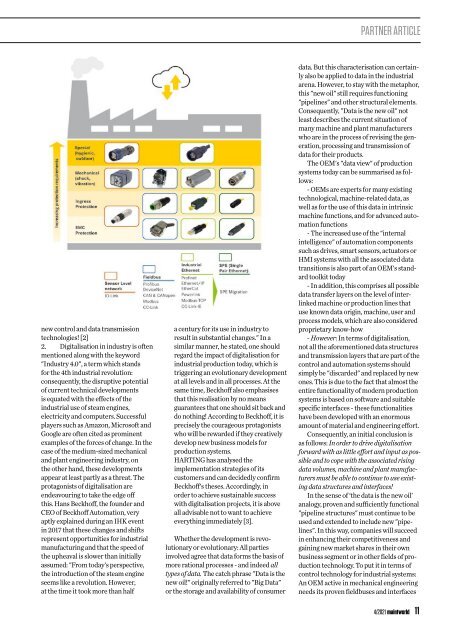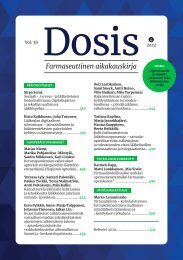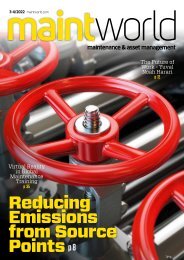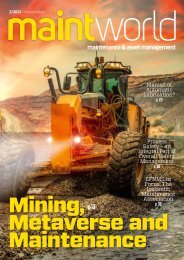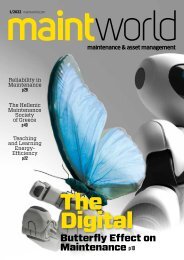Maintworld Magazine 4/2021
- maintenance & asset management
- maintenance & asset management
- No tags were found...
Create successful ePaper yourself
Turn your PDF publications into a flip-book with our unique Google optimized e-Paper software.
PARTNER ARTICLE<br />
new control and data transmission<br />
technologies! [2]<br />
2. Digitalisation in industry is often<br />
mentioned along with the keyword<br />
"Industry 4.0", a term which stands<br />
for the 4th industrial revolution:<br />
consequently, the disruptive potential<br />
of current technical developments<br />
is equated with the effects of the<br />
industrial use of steam engines,<br />
electricity and computers. Successful<br />
players such as Amazon, Microsoft and<br />
Google are often cited as prominent<br />
examples of the forces of change. In the<br />
case of the medium-sized mechanical<br />
and plant engineering industry, on<br />
the other hand, these developments<br />
appear at least partly as a threat. The<br />
protagonists of digitalisation are<br />
endeavouring to take the edge off<br />
this. Hans Beckhoff, the founder and<br />
CEO of Beckhoff Automation, very<br />
aptly explained during an IHK event<br />
in 2017 that these changes and shifts<br />
represent opportunities for industrial<br />
manufacturing and that the speed of<br />
the upheaval is slower than initially<br />
assumed: "From today's perspective,<br />
the introduction of the steam engine<br />
seems like a revolution. However,<br />
at the time it took more than half<br />
a century for its use in industry to<br />
result in substantial changes." In a<br />
similar manner, he stated, one should<br />
regard the impact of digitalisation for<br />
industrial production today, which is<br />
triggering an evolutionary development<br />
at all levels and in all processes. At the<br />
same time, Beckhoff also emphasises<br />
that this realisation by no means<br />
guarantees that one should sit back and<br />
do nothing! According to Beckhoff, it is<br />
precisely the courageous protagonists<br />
who will be rewarded if they creatively<br />
develop new business models for<br />
production systems.<br />
HARTING has analysed the<br />
implementation strategies of its<br />
customers and can decidedly confirm<br />
Beckhoff's theses. Accordingly, in<br />
order to achieve sustainable success<br />
with digitalisation projects, it is above<br />
all advisable not to want to achieve<br />
everything immediately [3].<br />
Whether the development is revolutionary<br />
or evolutionary: All parties<br />
involved agree that data forms the basis of<br />
more rational processes - and indeed all<br />
types of data. The catch phrase "Data is the<br />
new oil!" originally referred to "Big Data"<br />
or the storage and availability of consumer<br />
data. But this characterisation can certainly<br />
also be applied to data in the industrial<br />
arena. However, to stay with the metaphor,<br />
this "new oil" still requires functioning<br />
"pipelines" and other structural elements.<br />
Consequently, "Data is the new oil" not<br />
least describes the current situation of<br />
many machine and plant manufacturers<br />
who are in the process of revising the generation,<br />
processing and transmission of<br />
data for their products.<br />
The OEM's "data view" of production<br />
systems today can be summarised as follows:<br />
- OEMs are experts for many existing<br />
technological, machine-related data, as<br />
well as for the use of this data in intrinsic<br />
machine functions, and for advanced automation<br />
functions<br />
- The increased use of the "internal<br />
intelligence" of automation components<br />
such as drives, smart sensors, actuators or<br />
HMI systems with all the associated data<br />
transitions is also part of an OEM's standard<br />
toolkit today<br />
- In addition, this comprises all possible<br />
data transfer layers on the level of interlinked<br />
machine or production lines that<br />
use known data origin, machine, user and<br />
process models, which are also considered<br />
proprietary know-how<br />
- However: In terms of digitalisation,<br />
not all the aforementioned data structures<br />
and transmission layers that are part of the<br />
control and automation systems should<br />
simply be "discarded" and replaced by new<br />
ones. This is due to the fact that almost the<br />
entire functionality of modern production<br />
systems is based on software and suitable<br />
specific interfaces - these functionalities<br />
have been developed with an enormous<br />
amount of material and engineering effort.<br />
Consequently, an initial conclusion is<br />
as follows: In order to drive digitalisation<br />
forward with as little effort and input as possible<br />
and to cope with the associated rising<br />
data volumes, machine and plant manufacturers<br />
must be able to continue to use existing<br />
data structures and interfaces!<br />
In the sense of ‘the data is the new oil’<br />
analogy, proven and sufficiently functional<br />
"pipeline structures" must continue to be<br />
used and extended to include new "pipelines".<br />
In this way, companies will succeed<br />
in enhancing their competitiveness and<br />
gaining new market shares in their own<br />
business segment or in other fields of production<br />
technology. To put it in terms of<br />
control technology for industrial systems:<br />
An OEM active in mechanical engineering<br />
needs its proven fieldbuses and interfaces<br />
4/<strong>2021</strong> maintworld 11


